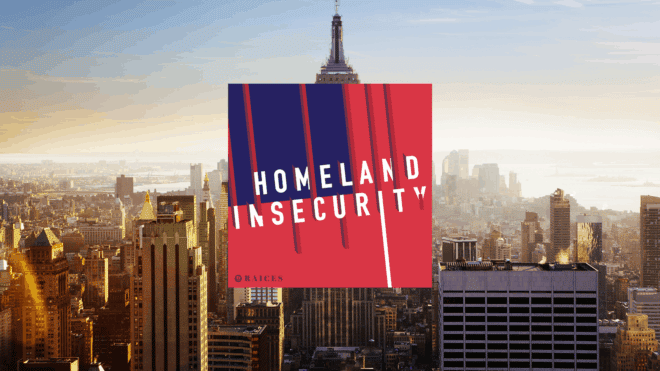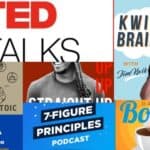Homeland Insecurity Tells the Real Stories of American Immigration Policies

What happens when you throw an unlimited amount of money at a problem that doesn’t exist?
You manufacture a problem to solve.
That’s what Homeland Insecurity, a podcast from RAICES, is about. A solution, the Department of Homeland Security (DHS), in search of a problem. Well, it starts that way anyway. It’s bigger than that.
To even attempt to make sense of any of this, you have to go back to 2001. As host Erika Andiola reminds us listeners several times throughout the series, 2001 was a scant 20 years ago. In the grand scheme of a nation, that isn’t all that long. It’s only been as long as I’ve been able to vote.
At the time, 9/11 felt radically different. And it was enormous. It felt like “we” had to do something. There was a visceral attitude that this could not be allowed to happen again.
But what “this” was, wasn’t clearly defined. We needed a story. We needed a them.
Wait. I thought we had a story?
The story of America is liberty, freedom, and opportunity for all, right? That’s the story of America. If all you’ve seen are television exports of School House Rock and speeches from rhetorically gifted politicians, it sounds grand.
That’s the story of America we want to project. The ideal we ought to live up to. That’s the story that acts as a beacon for migrant families like Andiola’s in the first place. But does that story bear out in reality? Is America the land of opportunity for all?
Our story, it would seem, is really about those who seize opportunity. And in the chaos that enveloped a nation jolted awake, there was opportunity.
Read more: Six Podcast Episodes About The American Immigrant Experience
The Structure of Homeland Insecurity
The first (so far) season of Homeland Insecurity is broken up into 8 episodes. Each goes to great length to paint a detailed picture of the facts, as they were at the time, and give us some insight into the post 9/11 mindset.
The narrative format layers history with accounts from government officials, reporters, and lawyers. As well as advocates, and immigrants themselves.
Andiola’s own story, as a migrant child with her mother, serves as the thread that ties the disparate parts of the story together. It’s the host’s story that makes this podcast work in ways another might not.
RAICES is an advocacy group, and Erika Andiola is their Chief Advocacy Officer, so the podcast comes to the table with a transparent agenda. Homeland Insecurity is not bound by any pretense of objectivity that might allow it to stray into a dry recitation of facts about DHS.
As the pod lays out, for being a bureaucracy employing almost a quarter million people, it does seem to be set up like a shell company. Replete with innocuous sounding policy names and facilities in the middle of nowhere, DHS is designed to sound mundane. To not attract attention. To be omnipresent, yet invisible.
But it is a department with unlimited budget and even less oversight. It’s ripe for abuse.
Or again… opportunity. It depends on who you are and what your motives are.
The Nature of Opportunity
All opportunity is not created equal.
I grew up in San Diego, California. San Diego, along with Tijuana, Mexico, make up the largest binational metropolitan region on the planet. I spent a lot of my youth in Baja California. For us, Mexico wasn’t a foreign country and Spanish isn’t a foreign language. Mexicans were not a threat. Mexicans were us.
On the morning of 9/11 I was 18, about to start my freshman year of college and working as the assistant manager of a multiplex movie theater. On the morning of September 9th, I said goodbye to my girlfriend with an obnoxious public display of affection. I then waived her off at the gate while she boarded her plane.
At. The. Gate. Let that sink in a minute.
By the 17th of September, I was reading an email from our general manager. Word had come from our district manager outlining our new policy that backpacks were no longer allowed into the theaters. For safety reasons we’d hold them, in a giant pile, in the box office.
This made perfect sense in the mind of a rattled 18 year old kid. We had to do something. This was our part. It was safety first. This was until another manager, one of the old guys chuckled and pulled me aside.
“Going to be a lot tougher to bring in those snacks, won’t it?” It had been all of 9 seconds. Tom didn’t skip a beat.
That was the opportunity. Movie theaters make money on concessions, not the box office. Concessions are where the margins are. They had the policy… they needed an opportunity.
Concessions and margins. That’s what DHS is all about. We make concessions in the name of security and those on the margins suffer. That’s Andiola’s story.
The Price of Unintended Consequences
I don’t want to give too much away. I won’t do the narrative justice. You need to go listen.
Homeland Insecurity cajoles the listener into reevaluating their own actions over the past 20 years.
America’s news cycle has a tendency to careen between crises. A tendency that was only accelerated over the past four years.
You don’t get the Trump Administration’s Child Separation Policy without the Obama Administration. Obama’s concessions to a Republican-controlled congress laid the legal framework.
The result was horrific.
The Obama administration turned local police departments into arms of immigration control. The message of “Yes We Can” devolved into deporting more people than any other President.
And that served as the foundation for family separation.
Once the genie is out of the bottle, it’s difficult to stuff back in. I mean, it’s a genie. It was hard to begin with, but genies are magical. That’s a whole other level of difficulty.
Spurring Action
There’s a lot of my story in this post. Much more than I thought there would be when I sat down to write it. A good podcast bounces around your head for a long time after you hit stop. It doesn’t let go until the gray matter physically changes. This is such a podcast.
The storytelling in Homeland Insecurity is evocative. And I think it’s what they were going for. I’m a straight white cis man in the United States. Due to blind luck, I am not marginalized. Quite the contrary: I am supremely privileged. I have a hard time seeing anything other than through that lens.
We all have a default. Andiola and her team, in just 8 episodes thus far, hold up a mirror and redirect some light into your lens. It’s not preachy. It isn’t radical. I thought I knew what I’d be getting when I sat down to listen to this pod.
I was wrong. I was surprised.
Read more: The story behind the founding and creation of International Podcast Day
We All Become The Enemy
The final episode of the season, without giving too much away, looks at what DHS did this past summer. It looks at the Black Lives Matter protests and the DHS response.
Homeland Insecurity takes its name from DHS, granted. It’s a clever play on words and the first season is framed by DHS’ creation. America has had and continues to have a pathological inability to reconcile the ideals we pay lip service to with the consequentialism of our collective actions. We jail little kids.
The Department of Homeland Security, in spirit and function existed before 9/11. It was in a binder, on a shelf, waiting for the opportunity. The security rationale for militarizing the border was asinine. The hijackers had visas and flew in commercially.
Those who wanted to profit saw an opportunity and took it. The motivation of those who sought to increase their bottom line is American. It isn’t all that different from the motivation of our district manager who wanted to put in place his bag ban to increase his bonus. He was waiting for the right time, and under the 25 foot American flag we hung in the lobby, he could do almost anything.
The scale is what is radically different. Nobody’s family was destroyed because they couldn’t bring in outside snacks.
It feels trite, but I think we’re supposed to see ourselves in Andiola’s story. Not to compare or feel some personal outrage, but to make the connection. I think that’s what spurs us to action and helps her advance the cause.
Where Does Homeland Security Go From Here?
So where does the show go from here? I don’t know. It ends on a cliffhanger. One we’re all living. What happens next is, in no small way, up to us. That’s the point. This story is larger than DHS. Larger than Andiola. Certainly larger than me.
Listen to Homeland Insecurity. It’s only 8 episodes, each around 40 minutes. Do it in a day. Do it over a week walking the dog. Budget some extra time to make some calls. Take some action.
After listening, you’ll need to scratch that itch. I know I did.













Comments
Comments are closed.